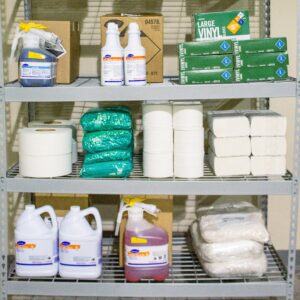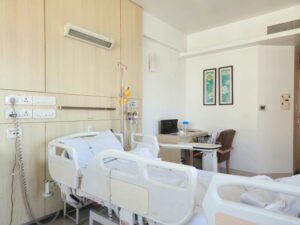We’re living in an unusual time. Most of the world is under a shelter-at-home lockdown and millions of people are out of work. With the COVID-19 pandemic still in full swing, it’s important to keep you and your family healthy. Unfortunately, we still need to eat and there are some things that require us to leave our houses. Essential businesses have remained open because they’re essential to staying alive, but that doesn’t mean they’re immune from viruses. As people venture through the aisles of the grocery store, refill prescriptions at pharmacies, or go to work as essential employees, it’s important to understand and implement a few best practices on how to prevent the spread and contraction of the COVID-19 coronavirus.
What You Should Know About COVID-19
Before diving into the specifics, we should clarify a few things about COVID-19. The virus is currently thought to spread from person-to-person through close contact and respiratory droplets. If someone has the virus, whether they’re showing symptoms or not, they can infect you from a coughing, sneezing, or even talking in a close proximity to you. It may also spread from contact with a contaminated surface or object, which is why extra precautions need to be taken when you’re out in public.
To make sure that you’re helping reduce the spread of COVID-19, it’s important to monitor your symptoms and stay home if you feel under the weather. COVID-19 is more serious for people with an underlying condition and you can spread it to others even if you’re only symptom is a cough or slight fever. To keep the community safe and help shorten the impact of this pandemic, stay home and contact a doctor if you show one or more of the following symptoms:
-
Fever
-
Tiredness
-
Dry Cough
-
Aches and Pains
-
Nasal Congestion
-
Runny Nose
-
Sore Throat
-
Diarrhea
The most common symptoms are fever, tiredness, and a dry cough, but COVID-19 has been known to present itself differently in different people. The symptoms usually worsen over time and about 1 out of every 6 people become seriously ill and develops difficulty breathing.1 If you think you have any of the symptoms of COVID-19, call your doctor first to make sure and get the proper protocol for testing and treatment.
Tips on How to Prevent the Spread of COVID-19
Since there is no current vaccine to prevent the spread of COVID-19, it’s important to take necessary precautions to reduce your chances of contracting it. The best preventative measure you can take is to avoid exposure to COVID-19. This means staying home and sheltering in place until health officials say otherwise. Unfortunately, for many of us, it’s impossible to stay home during the entire pandemic. Some of us are essential workers and need to go to our jobs every day. The rest of us still need to go to the store to buy food and other necessary items. Here are some of the best tips on how to prevent the spread of COVID-19 when you do leave your home.
Create a Game Plan
If you live with others, create a plan and designate one person to go out and get any necessary food or supplies. The fewer number of people that are being exposed to other people, the lower your risk is of spreading and contracting COVID-19. When you’re finished with the errands, have a designated area for you to disinfect yourself and any packaged food or other items you purchased.
When You’re Out
When you’re out in public, there are a some things you can do that will significantly reduce your chances of contracting COVID-19.
Keep a Responsible Social Distance
First and foremost, keep a responsible social distance from others. Avoid coming within less than six feet of anyone else while shopping or running errands to reduce your chances of exposure.
Wipe Down Surfaces
If you’re using a grocery cart or basket, take the time to wipe down the handles before you use them. Grocery stores often have wipes at the front or bring your own to make sure that you have them available.
Don’t Touch Your Face
While you’re out, do not touch your face. If you happen to touch a contaminated surface while shopping and then touch your face, you can contract COVID-19. Bring hand sanitizer to use while you’re at the store so you can sanitize before opening your car and again after you’ve loaded your groceries. This will reduce cross-contamination.
Consider a Homemade Mask
There has been a lot of conflicting information on whether or not you should wear a mask, but recently the CDC recommends that it might help to slow the spread of COVID-19 in a community. The reason is that if an infected person is wearing a mask, it will help prevent transmission of COVID-19 to someone else. Since a lot of cases are asymptomatic, this could help reduce transmission rates and flatten the curve. However, if you wear a mask, make sure that you know how to use it properly and dispose of it when done.
When You Get Home
As soon as you get home, wash your hands thoroughly with soap and warm water. It’s recommended that you disinfect any boxes that packaged food comes in—whether it’s from the grocery store or takeout—and wash produce thoroughly before putting everything away.
Disinfect Wisely and Thoroughly
You’ll also want to make sure that you’re disinfecting everything in your home wisely and thoroughly. Focus on high touch surfaces like doorknobs, light switches, tables, phones, and toilets and make sure that you’re using a disinfectant to do so. Always follow manufacturer information and use the products accordingly.
Take the time to regularly clean soft surfaces like couches, rugs, and drapes and wash clothes or rugs in the laundry if you can. Use warm water to kill the virus and dry accordingly. Use an EPA-registered disinfectant to help kill COVID-19 viruses around your home.
When disinfecting, don’t forget to clean electronics. Phones, tables, and other touch screens carry a ton of harmful bacterial, viruses, and pathogens that can easily be transferred to our face. Make sure you read instructions on how to clean your electronics without damaging them.
Wash Your Hands Often
Most importantly, wash your hands often. Use warm water and soap and scrub for at least 20 seconds, making sure that you cover the entire surface area. If you can’t use soap and water, use hand sanitizer until you can get to a place to wash your hands. Wash your hands before eating or preparing food, after using the restroom, after blowing your nose, coughing, or sneezing, after contact with pets, and before caring for someone else such as a child or an elderly family member.
To help keep your immune system in the best condition possible, it’s important to stay healthy during these times. While it’s tempting to sit around and indulge in junk food or over-consume alcohol, both of these wreak havoc on your immune system. Instead, opt for nutritiously dense foods and balanced meals. Limit your alcohol intake and try to stay active by doing some at-home workouts or yoga videos.
If you’re an essential business, one of the best things you can do to help prevent the spread and contraction of COVID-19 is to make sure that you keep your facility as clean as possible. Bee Line Support offers complete cleaning and disinfecting services for all industries and offer several options for deep cleaning your facility—either as a preventative measure or for confirmed cases. For more information on coronavirus deep cleaning services, visit our COVID-19 page or request a quote today.



